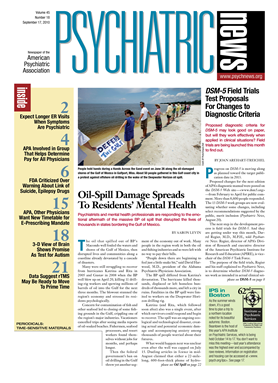Progress on DSM-5 is moving along as planned toward the target publication date in 2013.
Proposed changes for the next edition of APA's diagnostic manual were posted on the
DSM-5 Web site—<
www.dsm5.org>—from February to April for public comment. More than 8,600 people responded. The 13
DSM-5 work groups are now evaluating whether some changes, including select recommendations suggested by the public, merit inclusion (
Psychiatric News, August 20).
The next step in the development process is field trials for DSM-5. And they are getting under way this month, Darrel Regier, M.D., M.P.H., told Psychiatric News. Regier, director of APA's Division of Research and executive director of the American Psychiatric Institute for Research and Education (APIRE), is vice-chair of the DSM-5 Task Force.
The purpose of the field trials, Regier and his staff explained to Psychiatric News, is to determine whether DSM-5 diagnoses work as intended in actual clinical settings. For example, are the criteria for a specific diagnosis accurate descriptions of the symptom combinations presented by patients? Are these criteria reliable when used over time in the same patient? Are they reliable when used by various clinicians in different patient populations?
Given time and resource limitations, only select diagnoses were chosen for field-trial testing. The selection was based on a number of factors—for example, which disorders DSM-5 work groups felt were most in need of testing; whether a proposed revision represented a significant change from DSM-IV, and whether a proposed revision is considered important by the profession, patients, and/or the public. Some of the diagnoses that will be tested include attention-deficit/hyperactivity disorder, autism spectrum disorders, binge-eating disorder, conduct disorder, hoarding disorder, non-suicidal self injury, obsessive-compulsive disorder, pediatric bipolar disorder, temper dysregulation disorder with dysphoria, various personality disorders, and substance use disorders.
Eleven of the field trials—about one-third of them—will take place in large, academic medical settings. In May, APIRE announced a “request for proposals” from potential field-trial sites. Selections were based on a number of factors, such as patient volume, clinician staffing, and the prevalence and types of mental disorders typically seen in the setting and whether they related to the field-trial disorders of interest. The sites selected include four pediatric centers and two Veterans Administration hospitals.
The remaining 22 field trials will take place in individual practices and routine clinical settings because, as Regier explained, the psychiatrists and mental health professionals working in such settings “help make up the bulk of DSM users, and their input is greatly needed in order for us to understand what proposed diagnostic changes mean in the context of everyday care.”
“Routine clinical settings,” Regier explained, “refer to clinics or offices that are not necessarily housed in or affiliated with academic medical centers, such as individual and group private practices. We will be collecting numerous demographic and practice-related variables among all participants, including clinic characteristics (such as how many clinicians in the practice; types of patient populations seen; number of patients seen; etc.) and practitioner characteristics (such as degrees and specializations).”
Psychiatrists who are registered with the AMA Masterfile of all physicians (not just AMA members) may be randomly selected to participate in the individual practice and routine clinical setting field trials. Psychiatrists and other mental health clinicians will also be recruited to participate in them via announcements on the DSM-5 Web site, in APA publications and newsletters, and at APA meetings. Psychologists, social workers, and psychiatric nurses will also be recruited with the help of their respective professional associations.
Recruitment of these professionals is scheduled for October or November. The goal will be to have some 3,500 participating clinicians.
The 11 field trials taking place in large, academic medical settings are recruiting between 200 and 300 patients each, which should yield about 2,500 to 3,000 patients. Each of the 3,500 clinicians participating in the individual practice or clinical-setting trials will recruit two patients, which should yield an additional 7,000 patients. “Since each patient will need to give informed consent to participate, ‘recruit’ is the correct term,” Regier noted.
When clinicians participating in the field trials “test drive” various DSM-5 diagnoses, “they will not be given structured interviews to guide their questioning because we want to see how DSM-5 performs in ‘real’ clinical situations,” Regier said. But the clinicians will have a checklist of the proposed criteria to follow.
The field trials are scheduled to run until the end of March 2011. A second phase of field trials—which will be based on results derived from the first trials—is scheduled to take place from August 2011 to December 2011.
More detailed information about the field trials will appear in an October American Journal of Psychiatry commentary, whose lead author is Helena Kraemer, Ph.D., an emeritus professor of statistics at Stanford University and a member of the DSM-5 Task Force.
Psychiatrists who are interested in participating in the field trials can register at <www.dsm5.org> by checking the appropriate box. Or they can e-mail the American Psychiatric Institute for Research and Education at <[email protected]>. 
